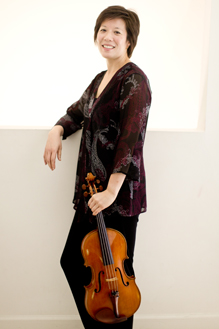Aspen String Trio Plays Dark Remembrances of Holocaust-Era Composers with a Sunny Side of Mozart
CVNC
By Laura Pollie Johnson
September 2018
The Asheville Chamber Music Series opened its 66th season at the Unitarian Universalist Congregation of Asheville with a riveting program by the Aspen String Trio centered around two Czech "degenerate composers" of Nazi-era Europe. Both Hans Krása and Gideon Klein were Jewish composers whose music was deemed "degenerate" by the officials of the Third Reich. Caught up in Hitler's dragnet, they ultimately died at Nazi hands. Both were deported to Auschwitz where Krása died in a gas chamber two days after arriving. Klein died in a coal-mining camp for men near Katowitz, Poland. To balance the haunting nature of this music, the concert concluded with Mozart's Divertimento in E-flat, K. 563. The performers were violinist David Perry, violist Victoria Chiang, and cellist Michael Mermagen.
The Aspen String Trio has been together for over twenty years, performing internationally, conducting residencies, and recording the complete trios of Beethoven, as well as Dohnányi, Hindemith, and others. Their specialty is thematic concerts such as this program of tragically suppressed composers by the Nazi regime. They routinely collaborate with other musicians on piano quintets and quartets, and string sextets. In addition to their residency at the summer Aspen Music Festival and School, they teach at various institutions around the country. Perry is artist-in-residence and professor of violin at the University of Wisconsin-Madison School of Music, where he was named a Paul Collins Endowed Professor in 2003. Chiang is a member of the artist/faculty of the Peabody Conservatory of Music. Mermagen is associate professor of cello at University of Missouri-Kansas City Conservatory of Music and Dance.
Cellist Mermagen served as spokesman for the ensemble, opening the concert with an invitation to the audience to imagine what it must have been like to hear the music under different conditions – in secret and in fear, as such performances were against the law. In the opening Passacaglia and Fugue for String Trio (1944) by Krása, the disintegration of established formal procedures seemed to mirror the surrounding realities of its composer. The cello's introductory ten solo notes gave rise to quiet entrances by viola and violin which quickly escalated into brief dance-like passages before the music became more frenzied and discordant, with the instruments "begging to differ" with one another. Different planes of activity emerged, with the instruments seemingly out of sync. The fugue briefly reestablished a sense of terra firma with the viola's first presentation of the theme, followed by the others, but ultimately that, too, unraveled, with the cello's getting "stuck" on the passacaglia/fugue theme, obsessively sawing it over and over. The violin and viola blasted out their own version of the theme, the whole sounding like a conversation conducted at a shout before the piece ended on a marvelous dissonance.
Next came the String Trio (1944) by Klein, who wrote it while he was in the Terezín concentration camp. This was his last known work before he was deported to Auschwitz. Klein was a pianist and composer who fully absorbed the Eastern European influences of Janáček and Bartók. The work's outer two movements are spirited, dance-inspired whirlwinds, peppered with folksy drones, metric dislocations, and some motivic exchanges. The central slow movement Lento is a soulful theme and variation set based on a mournful Moravian folk song about unrequited love. This was music to stir the soul, and the ensemble played this with masterful sensitivity and nuance.
To end the first half was Krása's "Tanec" ("Dance," 1944), his first string trio. Despite its generic title, the piece was an evocative sound-painting, as the cellist's roiling ostinato conjured the chugging noises of the dreaded transport trains en route to the concentration camps. With this as a black, sonic foundation, the work proceeded from its opening Presto, to a bit of a slowdown midway where the cello latched onto another ostinato, before the concluding Presto, where the first ostinato returned, more insistent than ever. The music was brilliant in its mercurial mood and melodic changes, and scurrying frenetic activity which ended in a flourish.
While the concert's first half showcased the ensemble's grasp of the titanic energy, dissonance and dissociative elements of the music of Krása and Klein, the second half highlighted the trio's ultra-refined musicianship via-à-vis the Classical music canon. Mozart's epic Divertimento was composed in 1788 and is his only complete surviving string trio. When the piece toured in 1789, it was Mozart who played the viola part. Each movement of the six was beautifully characterized and played with consistently beautiful tones, tight ensemble work, and musical intelligence. Movement four (Andante) was a real tour de force of ensemble playing with excellent contrasts in mood, energy, and tone color. Movement five, the second Menuetto with two trios, was especially charming and engaging, despite all the repeated material. What a joy it is to hear such seasoned musicians who clearly are at home with one another and who are such effective musical communicators! Thank you, Aspen String Trio, for a truly memorable evening!
